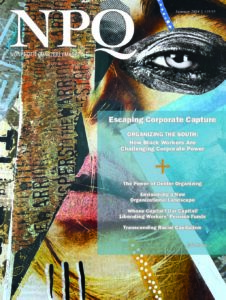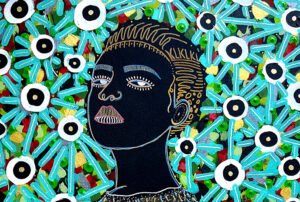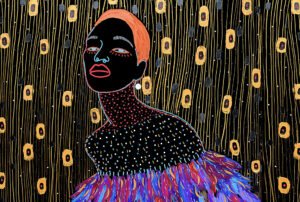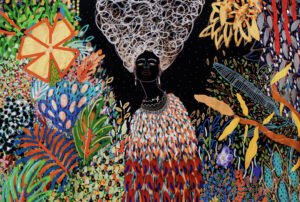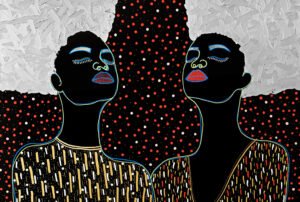
Editors’ note: This piece is from Nonprofit Quarterly Magazine’s spring 2024 issue, “‘Stop Drowning Us, and Stop Making Us Disappear’: A Critical Report on the State of Black Woman Leadership.”
As a queer Black woman in leadership—often the first—I want to emphasize the loneliness that has marked my journey to becoming the executive director of an LGBTQ+ organization in the nonprofit sector.
I have been gaslighted, discounted, and undermined at every junction of my career. I found that if I stayed the course, was successful, and did not outshine or question my White progressive counterparts, then I was okay—but as soon as I began to speak up about inequities occurring in my workplace, then suddenly I did not have emotional intelligence, or was taking things too personally, or somehow not only did leadership feel bothered by my “attitude” but also (phantom) staff felt the same. (Staff members were never named, leading to my paranoia vis-à-vis coworkers I once thought I could trust.)
This isolation has been especially pronounced in queer spaces, where I had hoped for a sense of home and an opportunity to create authentic strides toward equity, inclusion, and—especially—belonging. Sadly, I have often felt unsupported by my queer White counterparts, and that lack of support has been amplified as I move into my third year as the executive director of One Colorado—one of the state’s leading and longest-running LGBTQ+ advocacy organizations. Not only have I not received sustainable support, but I have also discovered, upon meeting with community leaders and donors, that these same “inclusive” LGBTQ+ leaders with whom I often find myself in the same room (and with whom I have to pretend to be okay) have described me as “radical” and/or “combative”—and/or have flat out said to those community leaders and donors that they should not work with me or donate to my organization because they could do the work better. Hell, I have had these same LGBTQ+ leaders tell me that I shouldn’t trust other LGBTQ+ Black and POC leaders trying to make it in Colorado—so it doesn’t surprise me that they talk about me.
The mentorship I sought has been frequently stifled by territorialism, pride, or complacency. While many may profess to be allies and use inclusive language or hire staff of color, genuine action remains elusive—and I often wonder: If a person like me, who has positional power, struggles to feel supported, what does that mean for the rest of my community who do not have the same type of access? I find myself asking, Are queer White and cis folks who have been in the game for a long time willing to dismantle the status quo? Are they willing to put themselves on the line for their BIPOC and trans counterparts who do not have the same connections but possess valuable knowledge and lived experiences that can move our communities forward? Right now, my answer is a resounding no—and that has been heartbreaking.
Failing cannot be an opportunity for growth or learning for us, because for Black women and gender-expansive communities, failure is not an option.
A deep wave of nausea, sadness, and anger coursed through my body as I read through the recent report Thrive As They Lead: Advancing the Infrastructure to Support Black Women Leaders in the D.C. Metro Area Nonprofit Sector.1 It felt like a full-on map of my own experience, complete with side and dirt roads leading to stress, anxiety, panic attacks, and pain. As the first Black person and woman to lead my organization, I have come across many of the issues outlined in the report. When I am lucky enough to be in a room with queer Black women and gender-expansive leaders, you hear these very same issues. We have dealt with staff and community having unrealistic expectations of who we are, funders who won’t return phone calls, and unsupportive board members. I have had funders who will connect with my gay cisgender male predecessors but not with me. I have had foundations reject applications and say that my organization is not Black-led enough! Not two weeks into my role, the first hint that this wasn’t going to be easy was when a person on my board had the nerve to tell me that One Colorado was not a Black Lives Matter organization, and that if I thought I was going to run the organization like that, then I’d better learn, quickly, to pivot. Not once had I ever mentioned BLM in my work at that point.
Two weeks in, I already wanted to quit. Fortunately, other board members stood behind me and have been supportive, helping our organization to become antiracist/anti-oppressive—and I am grateful for that. But even with their support, it has been difficult. I have to admit that there have been many times since then when I wanted to leave. My golden handcuffs are that we already know that there is a stereotype about Black women leaders not being good enough. And even though I have done amazing things as the executive director in fewer than three years—including bringing in one of the largest grants the organization has ever received; ensuring that all staff are paid above market value; not taking a raise my first year, so that other staff could get raises; leading our staff in supporting the LGBTQ+ community members in Colorado Springs after the horrific murders at Club Q; increasing the percentage of Black and transgender/nonbinary/gender-expansive staff—apparently, that hasn’t been enough. I still have radical queer White community leaders attacking me. I still have elected officials questioning my relationship with other LGBTQ+ community centers in Colorado, because of unwarranted rumors. I still have donors refusing to meet with me. I still have White cis gay donors who stopped donating, saying that politics aren’t important to them or that we have become too trans focused. I still have LGBTQ+ leaders competing with me and other Black/POC-led LGBTQ+ organizations for resources that are specifically for advocacy work or to serve Black and POC community members. Rather than working with us to best support our community, they choose to duplicate services and take credit for them. It is exhausting.
How do you take care of yourself when you know that if you are not perfect, it could cause harm to anyone else who comes after you? Failing cannot be an opportunity for growth or learning for us, because for Black women and gender-expansive communities, failure is not an option.
Sign up for our free newsletters
Subscribe to NPQ's newsletters to have our top stories delivered directly to your inbox.
By signing up, you agree to our privacy policy and terms of use, and to receive messages from NPQ and our partners.
My community, the LGBTQ+ community, is the embodiment of our ancestors’ wildest dreams. Much like our ancestors did before the shadows of White supremacy and colonization, we are living our lives authentically and freely. I don’t want to discount the vulnerable, hard times we are in—but seriously, we are living the life our elders could only dream of: our love, queer love and expression, is boundless, and it is our sacred duty to protect it at all costs. And that means protecting Black women and trans leaders who find ourselves leading LGBTQ+ organizations for the first time. Many of us are making history—Kelly Robinson at Human Rights Campaign, Imani Rupert-Gordon at the National Center for Lesbian Rights, Kierra Johnson at the Task Force, Nadine Smith at Equality Florida, Jaymes Black at Family Equality, and countless others—and we all deserve the same backing that our White colleagues had in these roles. We must actively work to dismantle barriers and nurture a society rooted in justice, equity, diversity, inclusion, and belonging. We must craft sustainable blueprints for our success.
I believe that LGBTQ+ community centers must be the birthplace of this transformation. LGBTQ+ community centers are the spaces in which we can shift from mere awareness of the challenges that impact us to taking meaningful action. And if we want those changes, then White queer cis leaders and funders are going to need to both admit that queerness does not inoculate them against misogynoir and disrupt their privilege to create a better path for success for Black women and trans leaders. As a queer Black cisgender woman, I too must disrupt my own cisgender and able-bodied privilege to be accountable to the harm I cause—and I am asking that my counterparts do the same.
I am always saying that I don’t want safe spaces, I want brave spaces, where vulnerable communities understand the power in our voices and can be fully seen and heard. Well, I can tell you that in my role, I don’t always feel either seen or heard, or that I can live authentically within my role—and that is unacceptable. Even while I write this, I am stressing out about how this will impact my staff, my community, and funders. I know that those leaders I have referred to will find some way to have their community back them while I take another thousand paper cuts to my soul. It’s what keeps me quiet publicly. I know the costs of speaking the truth. However, in a time when I have seen so many harmed, I choose to put myself first and speak my truth—and I only hope that I am heard so that others will be heard too.
Many folks in my circle have asked me why I chose to take on this role, especially because I did so in the middle of a pandemic. And in the beginning, it was because I believed in the work of One Colorado—and although I never wanted to be an executive director, after speaking with community, I believed I could do it. I wanted to show how true servant leadership could be done and how a queer advocacy organization in a mainly White state like Colorado could be led by this incredible Black queer woman who leads with heart, strength, and grit. I’m not sure if I remain as hopeful as I was. Time will tell.
I recently had the privilege of meeting the remarkable Black, queer author George M. Johnson, who, at a Banned Books Week event, declared that we need more than allies; we need accomplices—and, further still, we need assassins.2 An ally may stand behind you and offer support, and an accomplice may stand beside you and journey with you, but an assassin will stand in front of you to protect the most vulnerable, and allow you time to rest—especially, BIPOC and trans individuals who have been thrust into advocacy. Because if BIPOC and trans individuals do not fight, the consequences can be dire.
We need more assassins! We need to rest! I need to rest!
Notes
- Thrive As They Lead: Advancing the Infrastructure to Support Black Women Leaders in the D.C. Metro Area Nonprofit Sector (Washington, DC: Washington Area Women’s Foundation, 2023).
- George M. Johnson, at the Lake County Public Library Banned Books Week event, “All Boys Aren’t Blue,” October 5, 2023. And see George M. Johnson, All Boys Aren’t Blue: A Memoir-Manifesto (New York: Farrar, Straus and Giroux, 2020).



